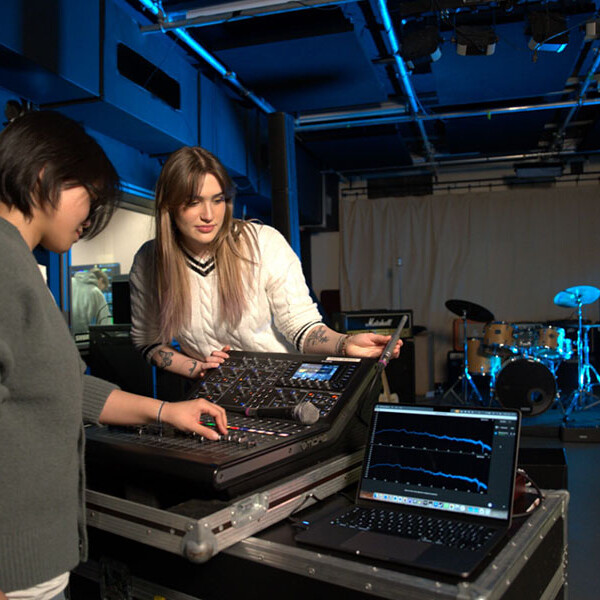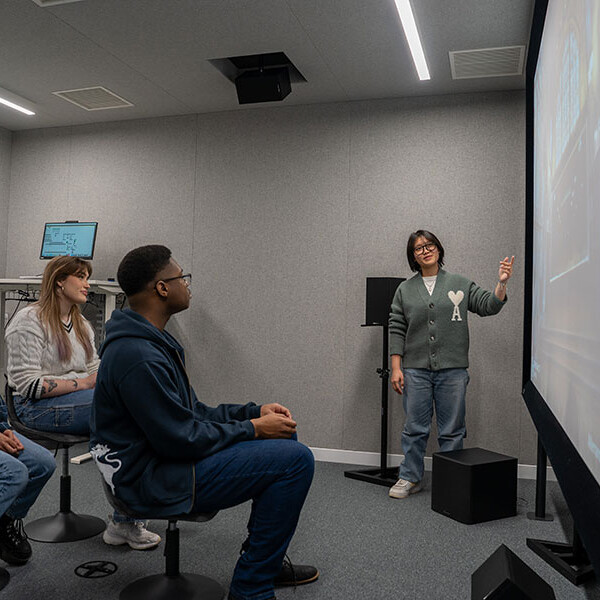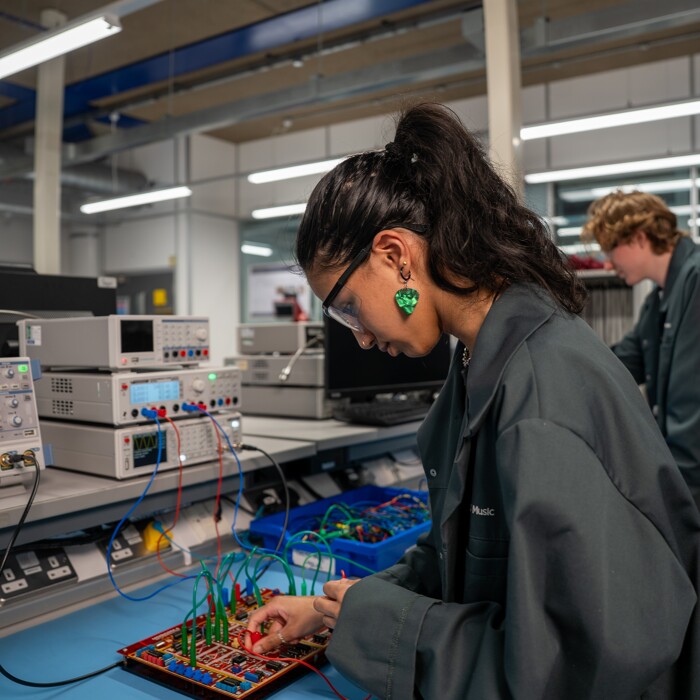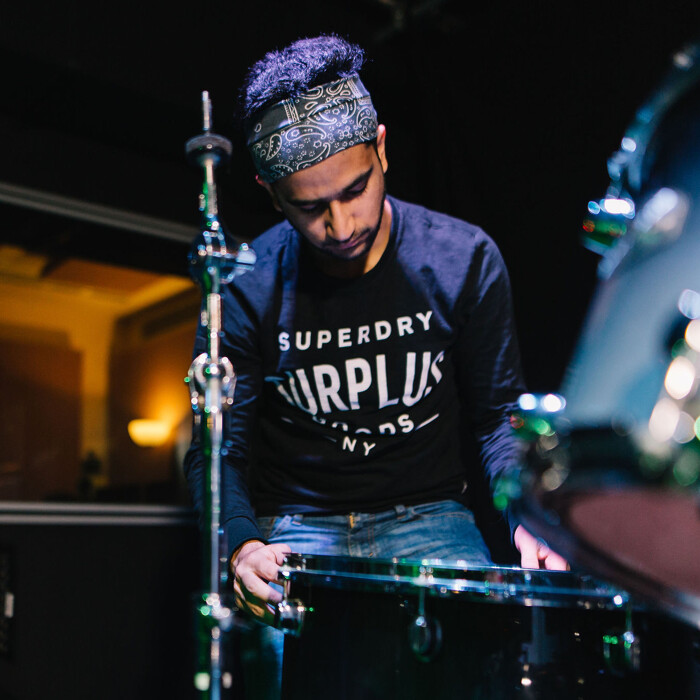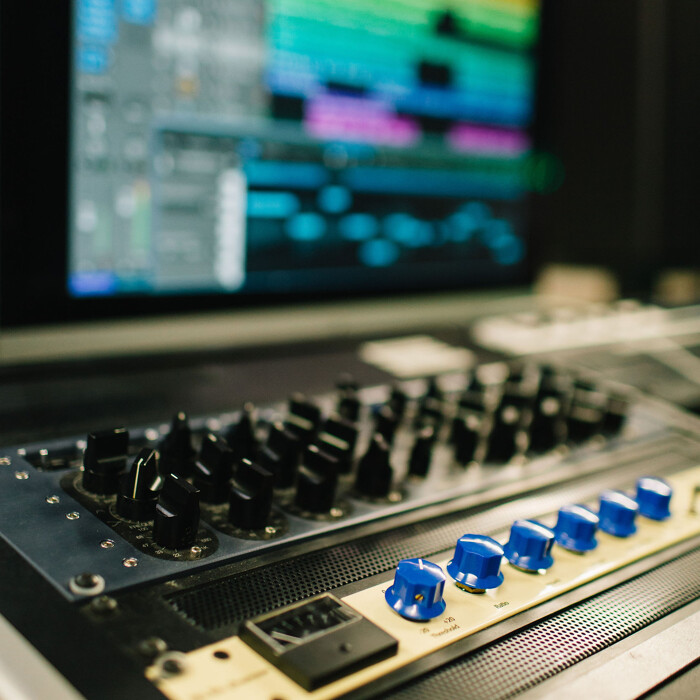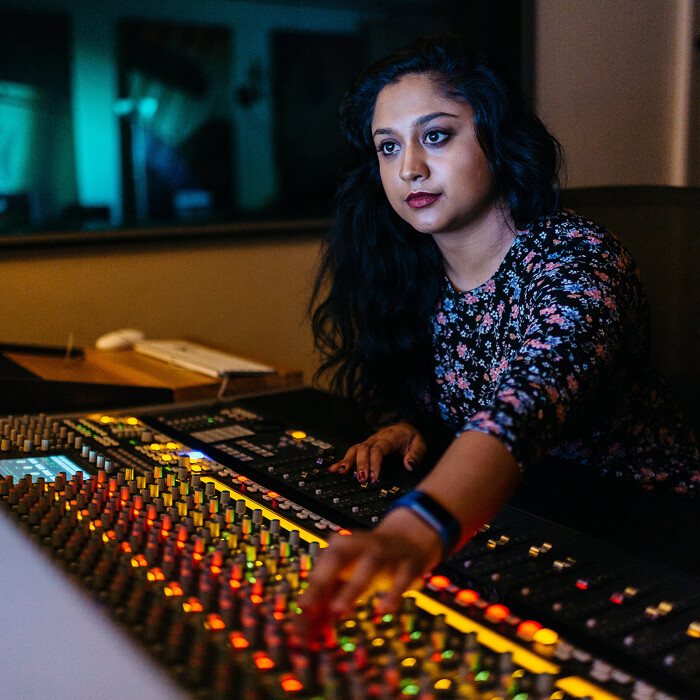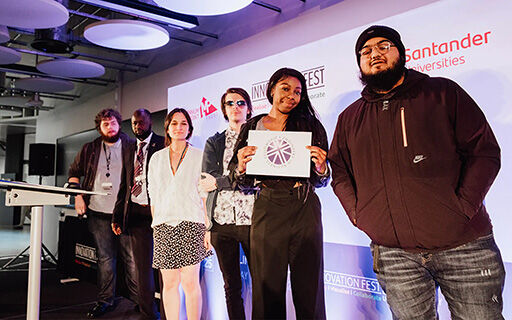
Sound Engineering with a Foundation Year - BSc (Hons)
Currently viewing course to start in 2025/26 Entry. Switch to 2026/27 Entry
September 2025 — UCAS code 1264
This BSc (Hons) Sound Engineering with a Foundation Year degree, delivered in collaboration with Royal Birmingham Conservatoire, will provide you with the technical skills and knowledge to pursue an exciting career in the world of audio technology and production.
48 points required
Calculate UCAS pointsClearing places available
- Level Foundation
- Study mode Full Time
- Award BSc (Hons)
- Start date September 2025
- Fees View course fees
- Subjects
- Location City Centre
This course is:
Available with Professional Placement year
Open to International Students
Overview
Clearing 2025
48 points (or equivalent) is the minimum you will need to be considered for this course in Clearing.
Use the UCAS Tariff Calculator to work out your points.
[00:00:02] Speaker 1: From studio spaces to mastering suites and workspaces. I'm going to show you what it's like to study sound at BCU. So this is the Concert Hall control room. This is where we do a lot of surround sound and get to record the amazing Bradshaw Hall here at the Conservatoire. So this is the SSL Duality Desk. It's one of the largest in the Conservatoire. Here we get to record the Bradshaw Hall and also everything in 5.1 surround sound and stereo. Now going to show you some of our recording studios at Royal Birmingham Conservatoire. let's go explore recording studio one. Here we have one of the control rooms that leads over to the live room here. You can record bands of all sizes. And again, on our SSL desk. We have it fitted with ProTools and Logic, Ableton and those that I can't even name off top of my head. But Play us out... [00:01:20][77.5]
[00:01:23] Speaker 1: Cheers mate. Let's go explore the live room. So here we have one of our biggest live rooms. And here is one of our biggest recording spaces. We've got kind of drum kits on the go grand pianos and mini grands in the studios. We've got Steinway here, Boston Pianos in other recording studios and Yamaha's across concert halls and stuff. We've got a range of great microphones ranging from AKG's to RODE's, Aston Spirits, and as you go through the years, the more better they get. So we don't just have one recording studio, we have multiple and they're all unique in acoustics and apparatus. So we have quite a lot of gear and different outboards to use to cater to your musical preference. We also have a very unique relationship here with the Royal Birmingham Conservatoire students. So, whether it's recording foley or mastering an EP, BCU really gives you the experience you need for the working world. So this is the mastering suite. This is where you take your recordings and make them into masterpieces. So here we've got state of the art speakers, we've got Bowers and Wilkins. We've also got amazing outboard gear from Maselec. We've also got SSL control servers and this whole thing is fitted out with a PRISM audio interface. But my favourite part of this entire room is the tape machine. So over here we have a Studer tape machine. There's not a lot around and we're one of the only universities is to have one. I myself have mastered many of my tracks on tape and it just adds that little antique-y sound and makes it quite clean and also rough at times, depending how you want to master your track. So this is the edit suite. This is where we get to kind of fine tune and make rough edits of our tracks. So as you can see here, this is ProTools and one of our most kind of common editing tool softwares, but we can also record in this facility. So we've got some Focusrite gear, Audient gear as well as ways to make beats. So we've got some crazy synths and sequences that you get to play around with, plug into the system and mix, make your own music really. So next I'm going to show you the Mac Labs. That's where we spend most of our time learning software and kind of having our mini lectures there. So let's go check it out. So this is the Mac lab. We have two of these in the Conservatoire. We have Macs in both, MIDI keyboards and audio interfaces. Here, we'll kind of have 1 to 1 sessions or smaller workshops with your lecturers learning different software like ProTools, Reaper, Ableton and Logic. One thing to note about BCU is the lecturers. They are very passionate about music technology. They give you work opportunities and experiences. Like myself, I had an opportunity to go to the Royal Shakespeare Company for a day and shadow the head sound engineer there, So it's very impressive with how much they care about their students and how much they're willing to give you. Now let's go tour the Millennium Point facilities. Welcome to Millennium Point. Over here we have even more studio space. So in this one we're still fitted out with SSL desks. We've also got a bunch of outboard gears. You've got good pressers, limiters, anything to help you make the best production possible. We've even got some unique acoustic equipment. So over in the studio we have a Helmholtz resonator made by one of our students, which I'll show you now. So over here is a Helmholtz resonator where frequencies and air will resonate in the cavities here. So certain frequencies we like and don't like will resonate, making the space more acoustically appropriate. So welcome to The Orchard - another room filled with Macs where we get to learn ProTools, Logic, Reaper for video games, Matlab for coding. In your third year you get to sound design and collaborate with video game students and make your own video game. We also do a lot of experimental acoustic stuff. So over here we have the drum tank where we will run frequency sweeps through a room, learn how frequencies interact with the acoustics of the space, and just kind of learn how sound reacts to a room. There's a lot of experimental stuff we get to do in our degree, as well as producing and as well as studio time. So together, they kind of go hand in hand and you really learn the whole science of sound. So I hope you enjoyed our tour today and seeing what it's like to study sound at BCU. If you have any questions or want to chat with one of our students, please look at the link in the bio. [00:01:23][0.0]
[77.5]
Do you dream of engineering the future of sound? Our BSc (Hons) Sound Engineering course with a Foundation Year is designed to immerse you in the cutting-edge world of audio technology and production, equipping you with the skills to pursue careers in live sound, acoustics, audio hardware and software development, and studio production. Delivered in collaboration with Royal Birmingham Conservatoire (RBC), this course blends technical expertise, creative flair, and hands-on experience to prepare you for a dynamic career in the world of sound engineering.
The foundation year will equip you with key knowledge and skills to ensure success on your degree.
The degree offers a comprehensive curriculum to develop your skills across several audio disciplines and employment sectors. You will explore the principles of acoustics, live sound, broadcast audio, studio recording, immersive technologies and software development. Alongside practical experience, you will engage with advanced topics, embracing embedded audio systems, machine learning in audio, and multi-channel sound design—positioning you at the forefront of the emerging technologies shaping the audio industry.
Our facilities are purpose-built for innovation and hands-on learning, from world-leading state-of-the-art recording studios at the Royal Birmingham Conservatoire to the immersive SoundLab® in STEAMhouse. You will use industry-standard tools such as Logic, Pro Tools, MATLAB, Python, and C++. You will study on state-of-the-art Solid State Logic (SSL) recording consoles, run live sound sessions with industry-standard PA, and utilise our vast array of microphones from Neumann, Brauner and AKG.

Introducing STEAMhouse
STEAMhouse is a centre for technology, innovation, creative thinking, prototyping and business development. Our £70 million pound building is the home for all of our Computing courses.
What's covered in this course?
Our industry-aligned modules have been designed and finessed through over 25 years of delivery within the field. You will gain invaluable experience and networking opportunities through our Industrial Mentors forum and annual Innovation Fest, connecting you with leading employers and excellent job prospects. Whether designing immersive soundscapes or audio systems, delivering live events, or mastering production techniques, this course equips you with the skills to excel in the evolving field of sound engineering.
Join us to turn your passion for sound, music or science into a dynamic and fulfilling career in one of the most innovative and exciting industries today.
Professional Placement year
This course offers an optional professional placement year. This allows you to spend a whole year with an employer, following successful completion of your second year, and is a great way to find out more about your chosen career. Some students even return to the same employers after completing their studies.
If you choose to pursue a placement year, you will need to find a suitable placement to complement your chosen area of study. You will be able to draw on the University’s extensive network of local, regional, and national employers, and the support of our Careers teams. If you are able to secure a placement, you can request to be transferred to the placement version of the course.
Please note that fees are payable during your placement year, equivalent to 20% of the total full-time course fee for that year.
Why Choose Us?
- World-leading state-of-the-art facilities: From recording studios at the Royal Birmingham Conservatoire to the immersive SoundLab® in STEAMhouse
- Excellent audio employability: access to a network of industry professionals and careers in live sound, acoustics, audio product development and studio production
- World-class teaching team: 25-years’ experience in audio science degrees at BCU
- Top 15 in the UK for Music Guardian League Tables 2025
Open Days
Join us for an Open Day where you'll be able to learn about this course in detail, chat to students, explore our campus and tour accommodation.
Next Open Day: 4 October 2025
Entry Requirements
These entry requirements apply for entry in 2025/26.
All required qualifications/grades must have been achieved and evidenced at the earliest opportunity after accepting an offer to help confirm admission and allow for on-time enrolment. This can also include other requirements, like a fee status form and relevant documents. Applicants can track their application and outstanding information requests through their BCU mySRS account.
48 points (or equivalent) is the minimum you will need to be considered for this course in Clearing.
Use the UCAS Tariff Calculator to work out your points.
Essential requirements
80 UCAS Tariff points. Learn more about UCAS Tariff points.
If you have a qualification that is not listed, please contact us.
Fees & How to Apply
UK students
Annual and modular tuition fees shown are applicable to the first year of study. The University reserves the right to increase fees for subsequent years of study in line with increases in inflation (capped at 5%) or to reflect changes in Government funding policies or changes agreed by Parliament. View fees for continuing students.
Award: BSc (Hons)
Starting: Sep 2025
- Mode
- Duration
- Fees
- Full Time
- 4 years
- £9,535 in 2025/26
- Apply via Clearing
International students
Annual and modular tuition fees shown are applicable to the first year of study. The University reserves the right to increase fees for subsequent years of study in line with increases in inflation (capped at 5%) or to reflect changes in Government funding policies or changes agreed by Parliament. View fees for continuing students.
Award: BSc (Hons)
Starting: Sep 2025
- Mode
- Duration
- Fees
- Full Time
- 4 years
- £17,690 in 2025/26
Places available to start in September
If you'd like to start this course full-time this September, you can apply through Clearing.
International and part-time students can apply online as normal using the links above.
Want to start in September 2026? You can apply via UCAS from September 2025.
Course in Depth
Foundation Year
In order to complete this course, you must successfully complete all the following CORE modules (totalling 120 credits).
The Foundation Mathematics module provides the basic knowledge and mathematical skills which will equip the students to continue their studies to an undergraduate programme. The module will be focused on mathematics related to the field of computing. The interactive taught sessions will use fundamental mathematical in discussions to broaden understanding of the theory and practice introduced in the module.
This module will provide you with an understanding of the role of digital technologies in transforming industries and sectors. It will provide you with a comprehensive introduction to core concepts of science for digital technology, and an understanding of the fundamental aspects of science essential for studying and working with digital technologies.
You will learn systems thinking methodologies to model systems supported by digital technologies, enabling you to understand different aspects of technology, and to design your own solutions. Moreover, this module will help you to develop essential academic and personal study skills necessary for success in higher education. It will provide you with basic research, academic writing, and reflection skills. These skills are vital for your transition to higher education and will enhance your learning and academic growth.
This module provides the skills necessary to design a web based application around a clear understanding of the business information requirements, a structured design of an interface and the development skills necessary to implement a solution. This module focuses on varied technologies relating to the design and development of application to meet the information needs of a business. The module will analyse and design an application that meets current web standards.
This module, focused on emerging technologies, will provide you with an understanding of the latest advancements and trends in Computing and their applications. Through discussions, practical examples, and hands-on activities, you will gain knowledge and insights into how emerging technologies are shaping the digital landscape and the world.
During the journey within higher education, developing your independent study is an essential skill to support shaping the knowledge to become more useful and applied within practice. This module aims to provide you with necessary skills and tips that should support you to work independently within your discipline and to successfully apply project management tools and techniques to a mini project related to your subject discipline. Within the module, various tutorials will encourage the elements or creativity, innovation and thinking. The skills developed from this module acts as a foundation both towards subjects within your discipline, and more importantly, your final year’s project in Level 6. This module will be supported with 2hrs of extra module support session.
Foundations of programming aims to provide you with the fundamental principles and practice-based activities needed to begin developing software programs. The module details the anatomy of a structured software program that includes the creation of a program algorithm, a logical, simple and organised program flow and the generation of pseudo and programming code.
The module uses a combination of theory and practice-based sessions designed to engage students in group and individual activities to identify the components of a software program and to apply their knowledge into hands-on software programming activities. During the module sessions you will acquire the basic skills to design and create software programs.
Year One
In order to complete this course, you must successfully complete all the following CORE modules (totalling 120 credits).
The Acoustic Fundamentals module provides a foundation in acoustics and psychoacoustics. You will delve into topics such as how humans hear sound, why musical instruments sound the way they do, and how room characteristics influence sound, gaining essential knowledge and skills to underpin your journey to becoming an experienced sound engineer. The module combines theory with industry-standard practical skills to deepen your understanding of sound, psychoacoustics, musical instruments, and room acoustics.
To pursue a career in the field of sound engineering the need to be proficient in the principles of digital audio is essential. This module will introduce the nature of digital signals, presenting the international standards for digital audio data and the common processes involved in the capture and processing of digital signals.
The Sound Recording module provides a base for you to develop key skills in recording and mixing, imperative for all fields of music technology and sound engineering. You will gain hands-on experience in state-of-the-art hybrid analogue/digital recording studios, exploring recording techniques and processes applicable to a wide range of acoustic and electric instruments. With a focus on analogue-based audio systems and processes, and microphone technology, you will apply this knowledge through a series of studio-based recordings.
This module will develop your key understanding of electronic fundamentals as applied to audio systems. It is assumed that you will have no knowledge of electronics and therefore will be taught the fundamentals of signals (voltages and currents), before moving on to components which make up circuits such as filters and amplifiers. As this is an audio electronics module focus will also be given to loudspeakers, microphones and headphones to give a broad understanding of the subject.
The Audio Programming module equips you with essential skills to design and implement audio-related software tools, bridging the gap between sound engineering and technical programming. In a digital age where audio production heavily relies on software solutions, mastering programming concepts is vital for aspiring audio professionals.
This module introduces the fundamentals of live sound reinforcement for small to medium-sized venues. You will gain hands-on experience with both analogue and digital live sound equipment. You will develop a comprehensive understanding of analogue signal flow, including the setup and use of equipment such as graphic equalisers and analogue mixing consoles, to establish a strong foundation before utilising digital systems.
In addition to practical skills such as equipment setup and configuration, signal flow, and troubleshooting, the module emphasises theoretical knowledge, including acoustic modelling, system optimisation, and the principles of electrical safety and compliance with modern health and safety standards.
Year Two
In order to complete this course, you must successfully complete all the following CORE modules (totalling 120 credits).
The Broadcast Sound module immerses students in diverse industry-inspired roles, fostering skills in ADR, and Foley, as well as field-based recording, dubbing mixing, and live radio streaming. Collaborating with BCU film students, you will develop interdisciplinary expertise through teamwork. This module combines studio and live production techniques essential for navigating the dynamic broadcast industry.
This module builds on the foundational knowledge acquired in the previous Audio Programming module, offering a practical and theoretical exploration of advanced audio processing techniques. This module provides you with an applied understanding of the principles and implementation of real-time digital audio effects, equipping you with the technical skills necessary for diverse audio engineering roles.
This module will develop your key understanding of audio systems, combining digital (software) and analogue electronics using microprocessor-based systems known as an embedded system. This module will develop your understanding of how audio equipment functions at a systems level, to provide an understanding of the way audio signals are processed in hardware and software and how they are integrated together.
Embedded Audio Systems builds upon previous knowledge gained in Audio Electronics and Digital Audio Fundamentals to increase applied understanding of sound engineering concepts in a practical and theoretical manner. The module has an emphasis upon practical design and introduces audio software development in a C++ related programming language for Arduinos or similar microcontrollers.
Furthermore, the module will explore different microcontrollers used for audio and the specific i/o necessary to interface to other systems. It will consider applications in audio consoles, interfaces, sequencers, and synthesisers
The Acoustic Applications module dives into the world of acoustics as applied in industry. You will explore how your favourite concert halls, recording studios and buildings are designed, how the sounds around you impact health and well-being, and how industry practitioners ensure this is controlled. The module combines theory and legislation with industry-standard practical skills to develop your understanding of building acoustics, environmental noise, soundscapes and product sounds.
This module is designed to reflect industry practice, bringing together interdisciplinary teams in the delivery of collaborative projects. Informed by our networks of industry-based practitioners, this module offers the opportunity for you to enhance both your technical and transferable skills. You will also develop your project management skills as you go through the process of problem-solving which is fundamental to the creative process.
The Recording, Production and Delivery module builds on Level 4 Sound Recording, elevating expectations for outcomes and fostering higher levels of collaboration. Students develop an individual recording portfolio based on personal areas of interest whilst acquiring core techniques and skills in key applications. Lectures, studio labs and software training sessions offer a broad range of practical mixing and production teaching alongside focus on critical listening, mix analysis and project evaluation.
Professional Placement Year (optional)
In order to qualify for the award of Bachelor of Science with Honours Sound Engineering with Foundation Year and Professional Placement Year, you must successfully complete all of the modules listed as well as the following Level 5 module:
This module is designed to provide you with the opportunity to undertake a credit bearing, 40-week Professional Placement as an integral part of your Undergraduate Degree.
The purpose of the Professional Placement is to improve your employability skills which will, through the placement experience, allow you to evidence your professional skills, attitudes and behaviours at the point of entry to the postgraduate job market. Furthermore, by completing the Professional Placement, you will be able to develop and enhance your understanding of the professional work environment, relevant to your chosen field of study, and reflect critically on your own professional skills development within the workplace.
Final Year
In order to complete this course, you must successfully complete all the following CORE modules (totalling 100 credits).
The Immersive Audio module explores immersive production strategies that move beyond two-channel stereo. This module is inherently interdisciplinary, providing an opportunity to design and communicate professional-standard soundscapes, and will develop your technical skills in immersive audio. The module incorporates a range of skills crucial to potential employment in acoustics, pro-audio, film, game and VR-related industries.
This module introduces students to the transformative impact of machine learning in audio engineering and sound design. It highlights the role of machine learning in powering innovations such as audio classification, sound event detection, music generation, and speech recognition. Students will gain a robust understanding of machine learning concepts and their application to audio tasks, developing the ability to design, implement, and critically evaluate data-driven solutions.
Building on the foundational skills developed in Live Sound Fundamentals, this module focuses on advanced techniques and workflows required for medium to large-scale live sound productions. You will gain a deeper understanding of digital systems, networked audio, and the operation of line array PA systems, developing the expertise to plan and execute complex multi-desk setups. This module emphasises team collaboration, advanced troubleshooting, and the technical skills necessary to manage sophisticated live sound environments.
The purpose of the module is to enable you to undertake a sustained, in-depth and research informed project exploring an area that is of personal interest to you. In agreement with your supervisor, you will decide upon your topic which will take the form of a practical outcome (artefact) with accompanying contextual material. The main consideration when choosing your topic is that it must be aligned to the programme you are studying, and you should consider the relevance of this topic to your future academic or professional development.
At this level, you will be expected to work independently but you will receive additional one-to-one support from your supervisor, who will be familiar with your chosen topic area. As you progress on the module, extra support will be available and this may take the form of group seminars, workshops and online materials that will help to develop your project.
In order to complete this course, you must successfully complete at least 20 credits from the following indicative list of OPTIONAL modules.
This module provides an opportunity to develop professional-standard recording work within personal areas of interest assimilating all the expertise acquired through the degree to date. You will acquire high-level skills in the preparation of projects for mastering, as well as execution of different types of mastering approach, to include remastering, to take music product to market.
This module provides an in-depth exploration of game audio, focusing on the design, implementation, and integration of adaptive audio within video games. Students will gain technical proficiency in creating interactive soundscapes, enhancing gameplay immersion, and using professional tools such as the Unity game engine and FMOD middleware.
Through collaborative projects, students will develop the skills needed to conceptualise and deliver high-quality audio solutions, mirroring real-world game development workflows. The module emphasises both individual and team contributions, preparing students for dynamic and interdisciplinary roles in the game industry.
Download course specification
Download nowHow you learn
You will be assessed both formatively and summatively by a number of methods. Formative assessment occurs throughout the programme and involves feedback from peers, tutors and individual reflection.
A range of summative assessment methods are employed involving both individual and group assignments, written coursework assignments and practical project work, laboratory experimentation, tests and examinations (seen and unseen, open-and closed-book). Assessment methods for each module are identified in a module guide and, for coursework, assessment details and criteria are specified in each assignment brief.
In accordance with the University Regulations you will be permitted two attempts at assessments. After your first sit, if you are unsuccessful in any of your assessments, there will be a final resit opportunity for which your mark, provided that you pass the assessment, will be capped at 40 per cent.
Attendance requirements
There are 30 attendance weeks in each academic year.
A typical week on this course will include 20 hours of contact time over four days, plus self study time.
International opportunities
The Centre has a partnership arrangement with the highly esteemed University of Rochester in New York State, USA. This exchange programme offers the opportunity for students to apply to study abroad for a semester in the second year. More generally, this arrangement feeds into the internationalisation of the course with students from the USA joining the cohort at BCU, opportunities for joint research projects and short academic exchanges.
Trips and Visits
Birmingham City University is located at the heart of the West Midlands, with a rich, vibrant music scene. With live venues from intimate jazz bars to rock venues, from festivals such as Moseley Folk Festival to world renowned Symphony Hall there are plenty of chances for you to gain hands-on experience! You will be able to enjoy professional-quality resources and access to highly accomplished musicians from genres including classical, folk, jazz, rock and electro.
Throughout the duration of your course you will be presented with several chances to gain hands-on industry experience, through musical festivals, events and much more. As a Sound Engineering student you will receive the opportunity to undertake trips through the Live Sound Society.
Employability
Enhancing Employability Skills
Your experience at Birmingham City University will ensure you’ll graduate as a creative problem solver, with significant experience of professional industry-standard hardware, software and systems. You will leave with a global outlook, primed to engage with the technical and aesthetic issues that will challenge the music and audio industries in the globalised and technologically mediated world ahead.
The Module Industrial Mentors scheme supports the enhancement of graduate employability through on-going engagement with industry specialists throughout the course. This initiative is based on facilitating interactions between students and individuals working across the music technology and audio sector via module-based forums. This innovative approach allows you to explore specific subject areas with experienced professionals working in the field.
You have the option undertake an assessed sandwich year between your second and final year, which will provide you with valuable work experience and give you the real-life skills you need.
The first year Music and Audio Industries and second-year employability, Projects and Management modules have been designed to give you a deeper understanding of aspects of this dynamic sector and offer insight that will help with your career development.
Placements
The Sound Engineering course offers you the chance to take a ‘sandwich’ year, in which you can undertake an industrial placement. This takes place after the second year of study and extends the course duration to four years.
There are a wide range of potential placements that you may pursue such as working in recording studios, record companies, in professional audio and theatres. Previously students have undertaken placements with companies such as SSE, Midas/Klark Teknik (The Music Group) and Dolby.
In the past our students have undertaken year long placements gaining crucial contemporary industry experience. One example is Christopher Savva who undertook a placement at the International Federation of Phonographic Industry. Christopher’s role included anti-piracy work, where he worked hand-in-hand with the major record labels on content protection and the pre-release protection of singles and albums. His work led to him being offered the chance to undertake some work at EMI as well as a week-long assisting role within Sony RCA Records’ marketing department.
Innovation Fest
Innovation Fest is designed to foster entrepreneurship and support the development of our first-year students as future world-changers. The festival contributes to the knowledge economy, increasing students’ employability by providing genuine portfolio material.
Facilities & Staff
Our Facilities
Our facilities are purpose-built for innovation and hands-on learning, from world-leading state-of-the-art recording studios at the Royal Birmingham Conservatoire to the immersive SoundLab® in STEAMhouse. You will use industry-standard tools such as Logic, Pro Tools, MATLAB, Python, and C++. You will study on state-of-the-art Solid State Logic (SSL) recording consoles, run live sound sessions with industry-standard PA, and utilise our vast array of microphones from Neumann, Brauner and AKG.
You'll have access to the following facilities:
- Royal Birmingham Conservatoire (recording, performance and teaching)
- Millennium Point Recording Studios (eight live and recording spaces)
- SoundLab®
- Parkside TV Studios
- Parkside Broadcast Studios
- Electronics and Solder Lab
- Mac Lab
Our staff
Ben West
Course Leader for BSc (Hons) Sound Engineering and Production, Lecturer in Audio Engineering
Ben West is the course leader for BSc (Hons) Sound Engineering and Production and leads the acoustics modules at BCU. Ben was an Acoustic Engineer in the automotive industry for ten years, holds an MSc in Acoustics with Audio Applications from the University of Salford, and is a Member of the Institute of Acoustics (MIOA).
More about BenAlastair Jamieson
Lecturer in Sound and Music Technology
Alastair Jamieson is the course leader for the BSc (Hons) Music Technology. With over 20 years of experience in live sound and studio production, he brings extensive expertise from both professional and academic spheres. He has worked with artists including Adele, UB40, Duran Duran, Steel Pulse, and Music for Youth. Alastair designed, built, and...
More about AlastairDr Roy Priest
Associate Professor of Computing
Based in the College of Computing, Roy is College Academic Lead for Employability and Mobility. Prior to working in higher education, Roy was involved in various aspects of the music industry, as a professional musician and also working in artist management and legal and business affairs.
More about Roy